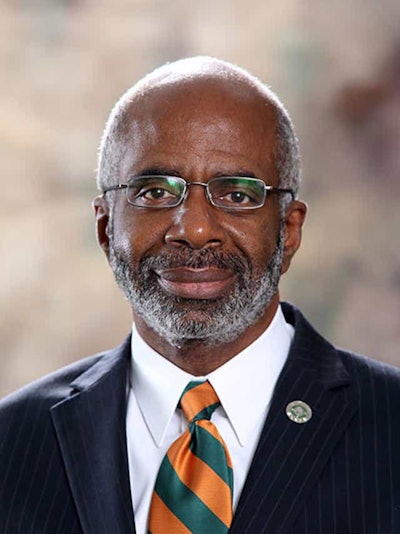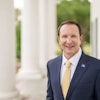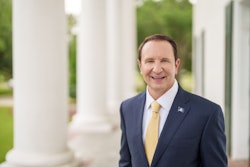 Dr. Larry Robinson, president of Florida A&M University
Dr. Larry Robinson, president of Florida A&M University
During a session at this week’s annual meeting of the Association of Public and Land-Grant Universities (APLU), university leaders shared strategies from Minority Serving Institutions (MSIs) to better support underrepresented students and faculty in STEM.
“There is clearly a great need for us as individuals and as a society to increase our minority and student of color STEM graduates,” said Peter McPherson, president of APLU, a higher education research and advocacy organization. “It seems to me that these deep concerns we’ve had for a long time have a real opportunity now. This question has caught the imagination and attention of so many people.”
McPherson pointed to the anticipated boost in federal funding to MSIs that Congress included in a social spending bill expected to pass soon. He also brought up the increased public dialogue on diversity, equity, and inclusion. To diversify STEM more, McPherson said that “fuller, broader” partnerships between MSIs and other institutions are needed at this time.
A 2011 report from the National Academies highlighted a severe lack of minority participation in science, technology, and engineering. Yet ten years later, there has been a minimal increase in diversity among STEM majors and graduates. But MSIs, including historically Black colleges and universities (HBCUs) and Hispanic Serving Institutions (HSIs), have led the way in trying to buck this trend. Almost 30% of Black graduates of science and engineering doctoral programs came from HBCUs, for example.
Dr. Larry Robinson, the president of Florida A&M University (FAMU), one of the country’s largest HBCUs, and a former chemist, spoke to why underrepresented students in STEM matters.
“We need students in our world to address problems facing the communities they are from,” said Robinson, adding that the pandemic’s disproportionate toll on communities of color shined a light on that need. “We know there are tremendous health disparities, so we want our students to go out and solve those problems. It’s not only what students can do for themselves but also for the state and the nation.”
But Robinson noted that the nation can invest more in MSIs, including HBCUs, to develop their own STEM graduate and professional programs: “That could be a great opportunity to move the needle on representation across the spectrum.”
Dr. Renetta Garrison Tull, vice chancellor of diversity, equity, and inclusion at the University of California, Davis (UC Davis), added that predominantly white institutions can develop programs modeled after MSIs to better help underrepresented students in STEM. UC Davis enrolls more than 35,000 students as a predominately white institution, though it is moving toward becoming a Hispanic serving institution. Tull mentioned UC Davis offers minority students a number of affinity programs, such as the Center for African Diaspora Student Success as well as a center for undocumented students.
“All of these initiatives simulate environments that are like MSIs,” said Tull, who graduated from Howard University, another HBCU. “Because those different initiatives help students find their place and have a space for belonging.”
Before UC Davis, Tull worked at the University of Maryland, Baltimore County (UMBC) with the well-known Meyerhoff Scholars Program. That program remains a national model in preparing marginalized undergraduates for STEM graduate programs and careers. In her work at Davis, Tull said she has brought the program’s emphasis on community building in particular.
“One of the biggest challenges that we have seen, both in Maryland and California, is the notion of, build it and they will come,” said Tull. “It is not enough to just build a program and in theory have this beautiful framework with all these initiatives attached. We really need to have people connecting, building trust, building relationships. All of these processes take time, energy, and a strong desire to engage.”
Dr. Ann Quiroz Gates, senior vice provost of faculty affairs at the University of Texas at El Paso (UTEP), an Hispanic Serving Institution (HSI), agreed with the importance of relationships. In 2018, UTEP became an R1 institution in the Carnegie Classification of Institutes of Higher Education. That means UTEP ranks among universities with the highest levels of research activity.
Yet Gates noted that UTEP is the only non-selective R1 institution because it is an open access university. About 50% of UTEP’s graduating class of 2020 were reportedly in the lowest income quartile. Gates added that providing historically underrepresented students in STEM with mentorship from faculty who share their experiences is also key to fostering belonging.
Dr. Heidi M. Anderson, president of the University of Maryland Eastern Shore (UMES), an HBCU, has similarly focused on mentorship programs for STEM students. But UMES also looks beyond its campus to connect their students with local elementary school students.
“We want to think about what kind of mentoring our own students can do with K-12 students to help them go into STEM professions as well,” said Anderson.
For higher education leaders eager to strengthen recruitment and retention of underrepresented students in STEM, Tull advised they should have diversity, equity, and inclusion (DEI) a part of their university’s strategic plan.
“And make sure that DEI is a regular topic with leadership teams to have a level of accountability with that aspect of the plan,” she said.
Robinson said that it's important to recognize the potential in every student.
“I come from a very similar background as my students,” he said, sharing that he grew up in a single-parent household with six siblings and few resources. “That shows my students that they are part of something big. That I expect them to do it and know that they can.”
Rebecca Kelliher can be reached at [email protected]



















